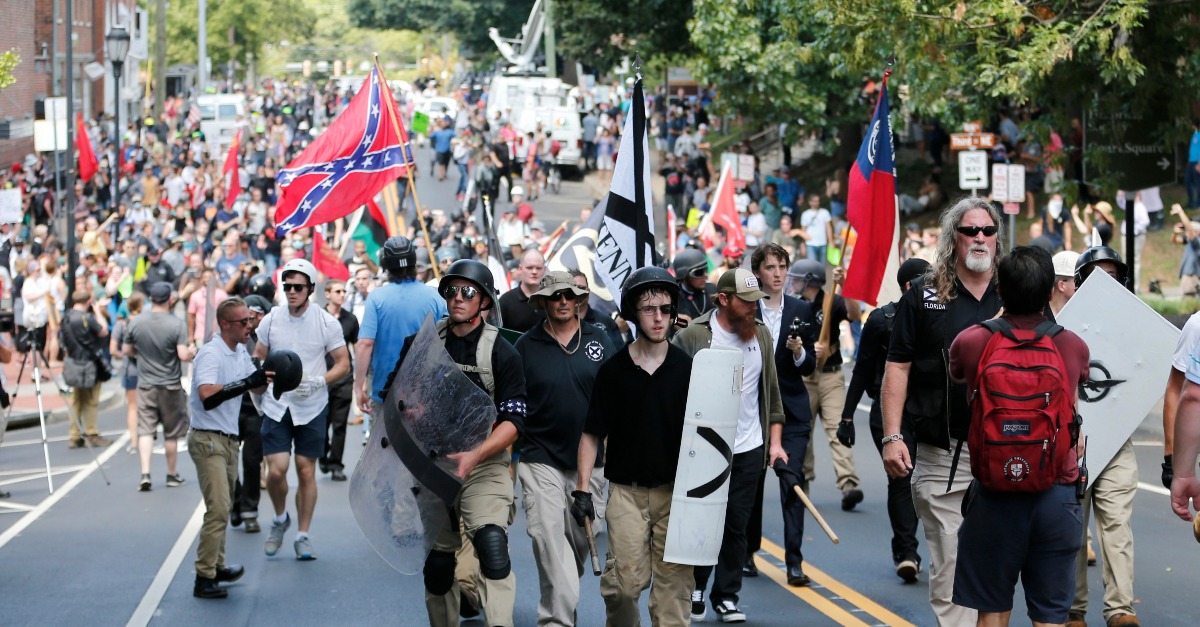The aftermath of the abhorrent white nationalist violence in Charlottesville, Va., on Saturday has been significantly dominated by discussion of who said what, how and why.
Videos by Rare
President Trump’s comments, of course, have taken center stage. First, he said too little — failing to explicitly condemn the racist organizations and ideologies involved — and then, on Tuesday, he said far too much, indefensibly praising large portions of Nazi-slogan-chanting crowd as “very fine people” who were “protesting very quietly” because they just wanted to preserve a historic statue.
Watching the responses to Trump, as well as various statements from other public figures, I keep coming back to three truths that should be obvious in these conversations but apparently aren’t.
RELATED: The unrest in Charlottesville will hurt America only to the degree that we let it
1. Free speech can be complicated.
The violence that broke out in Charlottesville has prompted many, understandably, to question whether free speech is all it’s cracked up to be. “Nazis were permitted to march and speak” in Charlottesville, said one article on the subject, and the “result was not more freedom for all … it silenced at least one person forever.”
I’m not remotely convinced that the best way to respond to racism, fascism and other unsavory ideologies is to give the government power to suppress speech it does not like. As Glenn Greenwald ably argued in a lengthy piece about free speech in the face of violence, “purporting to oppose fascism by allowing the state to ban views it opposes is like purporting to oppose human rights abuses by mandating the torture of all prisoners.” In fact, as he added, among “the defining attributes of fascism is forcible suppression of views.”
Still, I’m more than willing to concede free speech can be complicated and frightening. It’s not easy to look at Charlottesville and defend the civil liberties of actual Nazis. I believe calls to regulate speech in the wake of this sort of tragedy are at best naïve and misguided, and at worst a dangerous, authoritarian opportunism, but honesty demands even we free speech absolutists recognize the complexity here.
2. Condemning blatant racism is not complicated.
By contrast, how we respond to really blatant racism like Nazism, the KKK and white supremacy more generally is not complicated.
What has been remarkable about the debate over Trump’s comments is the level at which we’re having this discussion, namely at the very baseline — the bare minimum — of moral decency. It has reminded me repeatedly of two Scripture passages. The first is in the Sermon on the Mount, when Jesus is talking about loving your enemies. “If you love those who love you, what reward will you get? Are not even the tax collectors doing that?” he asks. “And if you greet only your own people, what are you doing more than others?”
The other passage is in the epistle of James, in a section about how real faith will be actively expressed in good works. “You believe that there is one God. Good!” James writes. But, he adds, “Even the demons believe that.”
The point in both passages is that the bare minimum isn’t enough. For someone who follows Jesus, loving friends and agreeing God exists is the bare minimum — in other words: don’t stop there.
Likewise, condemning barefaced white supremacy is not where our conversations about race in America should be at this point. As David French writes at National Review, “it is so easy to say the right thing here” at this basic level. It’s the bare minimum, which means it’s not enough. Don’t stop there.
It is sad and, after Tuesday, indisputable that this baseline is a standard the president is either unable or unwilling to reach, but his deficiency of character does not excuse the same in the rest of us.
RELATED: There were no “fine people” on the white nationalist side of the Charlottesville clash
3. Condemning one pressing evil does not entail condoning another.
Whenever our political conversations turn to topics as contentious as free speech and race, whataboutism is sure to make an appearance. With Charlottesville, it has most often appeared — and indeed was employed by Trump himself — to equivocate between the violence of the white nationalists and their counter-protestors, or to downplay the gravity of the former given the latter.
This tactic is clever but also unfair. If someone focuses on condemning the more pressing evil in Charlottesville, which is unquestionably the white nationalism, it does not mean that person is condoning, ignoring or accepting other evils, including the violence of some anti-fascists mixed among a mostly peaceful crowd of anti-racists.
Debates about speech and race and everything in between aren’t going to go away, and I doubt they’ll get easier any time soon. But they can at least be more fair and honest, more kind and constructive, if we remember these truths.



